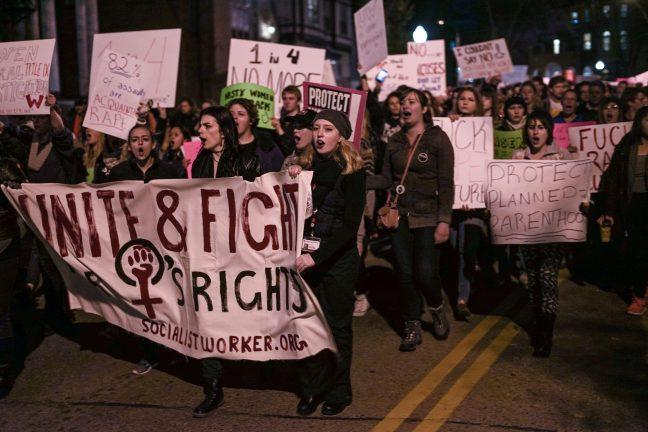This election has hit me hard. I skipped all my classes the day after just to process.
I didn’t cry, not at first, not until a good friend messaged me to tell me they’d stand by me whatever happened, not until my parents asked me to get a passport, not until they told me they were scared because they figured I would leave.
They know I’m bisexual, as do most of my friends, and given the promises of Trump and his cronies, they know life will most likely get a lot harder for me and others who identify like I do. The rhetoric from him and his associates is almost mind-numbing, and honestly I hate to face it, name it, analyze it. But I have to, to survive.
In terms of concrete actions and policy, Trump can — and has said that he will — appoint far-right Supreme Court justices who would try to overturn marriage equality, reverse Obama’s executive orders protecting LGBTQ+ federal employees and employees of federal contractors from discrimination, stop supporting equal rights for trans students in schools and sign the First Amendment Defense Act into law. This law is designed to protect people and companies who discriminate against LGBTQ+ people, specifically by acting on beliefs that marriage is between a man and a woman and that sex should only happen in such a marriage.
Given all this and the views of the people he has chosen to hold positions of power, it is extremely likely that Trump will do all he possibly can to ensure it’s legal to fire us, deny us housing, deny us healthcare, kick us out of businesses, prevent us from adopting children, and otherwise discriminate against us in every way possible.
So many people before me have fought and risked their lives in the hopes that we, here in 2016, would never have to fear this sort of a nightmare. And as much as I am scared now for myself, as a white middle-class queer woman I am much more scared for the people I care about.
If the bigotry, increase in hate crimes and utter disregard for my life had not been enough to hold me down for weeks, how much more must the people I care about be struggling? This thought kept me going after the election. I kept repeating in my head: there is work to do, there is work to do, there is work to do.
As much as I am scared, what about the trans women I care about? What about the Muslim women? What about the people of color? I’m scared that nothing I do against violent, fear mongering neo-Nazis will be enough, and I’m scared that my fellow white people will turn a blind eye because we are safe.
That, for me, was the other blow — 53% of white women voted for Trump. I wish I was more surprised, but I’m a white woman too: I know very well what we’re taught.
I know what is expected of “good” white women and I know that many white women would throw everyone else under the bus to protect their own white privilege and domination.
The truth is that most other groups have us pegged. We can rest assured that others will work hard to assume the best of us, we can count on nearly infinite chances to make up for our mistakes and we know that any time we cry that our innocence is being assailed, a thousand white men and many others will show up to defend us.
As white women, we are extremely dangerous to people of color because powerful groups will take our side and assume we are the wronged party. White womanhood means that when I walk into a group of new people, society has already told them that I am good-hearted, honest, non-threatening, innocent and sincere. It means that the myth of my purity has been used to justify discrimination and racist violence.
This all took me a long time to realize. From this perspective, I’m sure many white women didn’t view voting for Trump as voting for a misogynist who would erode their rights and freedom, but as voting for someone who would uphold all the privileges of white womanhood by further enshrining racism and giving power to white supremacists. Even white women who voted for Trump for other reasons chose to put their concerns about their own socioeconomic standing over the lives of others. When push comes to shove, too many white women are prepared to abandon all other women in favor of whiteness, even abandoning other white women who don’t fit the ideal: queer women, trans women, disabled women, non-binary/genderqueer women, poor women, etc.
I’m still so disheartened and worried, but it gives me hope to see so many women — the nastiest women — speaking up, pointing out the warning signs of fascism and state-sponsored mass violence, and refusing to be quiet about it.
So I will refuse to be quiet. And to my fellow white women: we have work to do. It’s time to let go of the lie of our fragility and hold ourselves accountable for our words and actions. We need to make sure it stops here. When we are invited to stand alongside marginalized women, we need to be on the front lines. And when we are not, we need to use our privilege, and our wallets, to the absolute best of our ability.
I will stay here, openly queer, fighting to protect others. As an ally it is my responsibility, knowing I have less to fear than so many others do. At this unsettlingly familiar crossroads, it is absolutely vital that those of us who have the ability and the power stand up, listen to those who are in danger, and loudly and publicly fight back.
Gwynna Norton ([email protected]) is a senior majoring in math.








